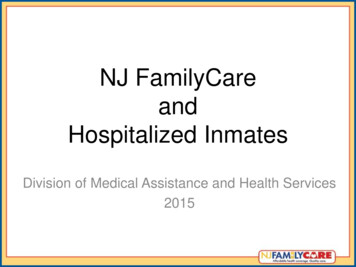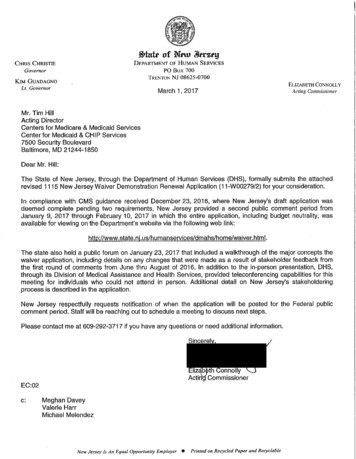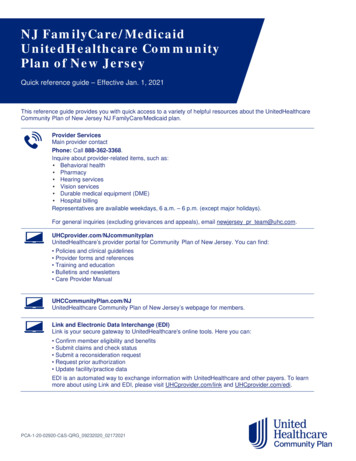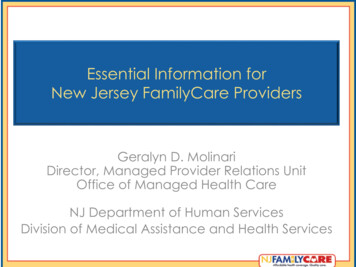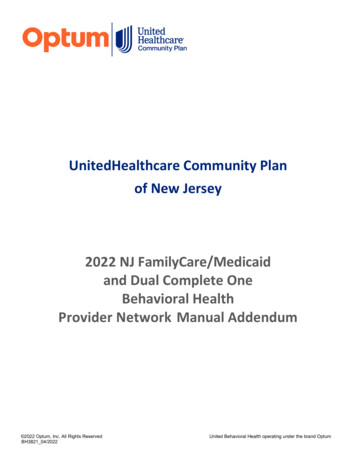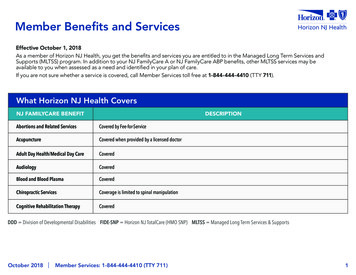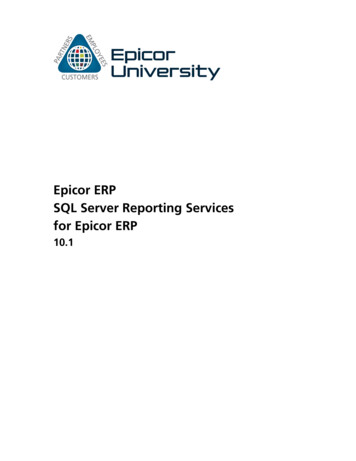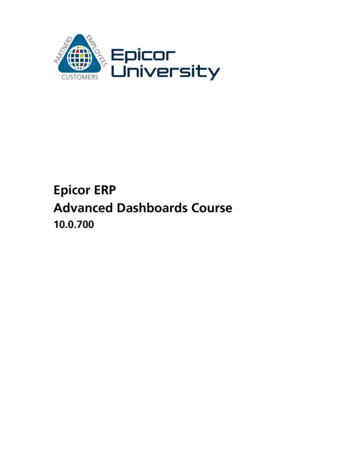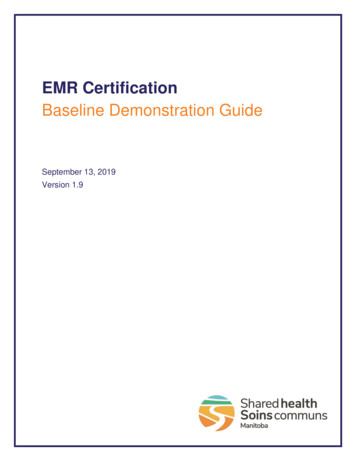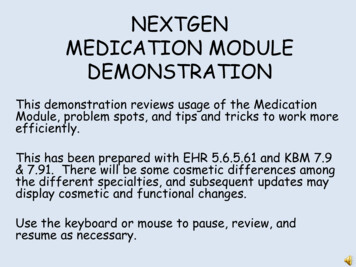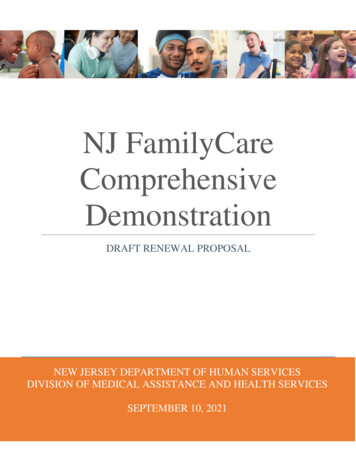
Transcription
NJ FamilyCareComprehensiveDemonstrationDRAFT RENEWAL PROPOSALNEW JERSEY DEPARTMENT OF HUMAN SERVICESDIVISION OF MEDICAL ASSISTANCE AND HEALTH SERVICESSEPTEMBER 10, 2021
NJ FamilyCare Comprehensive Demonstration – Draft Renewal ProposalContentsI.Introduction . 3II. Background . 3History of New Jersey’s 1115 Demonstration . 3Demonstration Accomplishments . 5Key Goals for Demonstration Renewal . 6III. Previously Approved Demonstration Elements . 7Managed Care . 7Behavioral Health Carve-In . 8MCO Enrollment . 11Home and Community-Based Services Programs . 11Managed Long Term Services and Supports . 12Children’s Support Services Programs . 13Division of Developmental Disabilities Programs . 18Eligibility and Enrollment Flexibilities . 24Office of Public Guardian Pilot Program . 24Self-Attestation of Assets . 24Premium Supports (CHIP). 24Home Visiting Pilot. 25OUD/SUD Services. 25Substance Use Disorder Promoting Interoperability Program . 26DSRIP. 27IV. New Proposed Demonstration Elements . 28Maternal and Child Health . 28Extension of Postpartum Coverage . 28Medically Indicated Meals Pilot Program . 29Supportive Visitation Services . 30Integrated Care for Kids (InCK) . 32Housing Supports . 321
NJ FamilyCare Comprehensive Demonstration – Draft Renewal ProposalInfrastructure . 33Medicaid Covered Housing-Related Services . 36Nursing Home Diversion and Transition . 39Housing . 40Caregiver Supports . 40Nutritional Supports . 41Behavioral Health . 42CCBHC . 42Pre-Release Services for Incarcerated Individuals . 44Subacute Psychiatric Rehabilitation Beds . 45Community Health Worker Pilot Program. 45Regional Health Hub Initiative . 46V. Authorities . 47Waiver Authorities . 47Expenditure Authorities . 49VI. Expenditures and Budget Neutrality. 51Historical Enrollment and Expenditures . 51Assumptions . 54Renewal Period Budget Projections . 57Projected Impact of Demonstration and Compliance with Budget Neutrality Requirements . 60VII. Evaluation and Monitoring . 62Interim Evaluation Report – Current Demonstration Period . 62Evaluation Strategy – Renewal Period . 63Existing Demonstration Elements . 63New Demonstration Elements . 64Summary of Monitoring Activities . 702
NJ FamilyCare Comprehensive Demonstration – Draft Renewal ProposalI. IntroductionNew Jersey’s Medicaid program and Children’s Health Insurance Program (CHIP) operate undera single, unified 1115 demonstration: the New Jersey FamilyCare ComprehensiveDemonstration. This demonstration is currently in its second five-year performance period,which is slated to expire on June 30, 2022. Consistent with terms and conditions of the approveddemonstration, New Jersey intends to submit a renewal application to CMS by the end ofOctober 2021.In support of our forthcoming renewal application, the New Jersey Division of MedicalAssistance and Health Services (DMAHS) has prepared this pre-submission draft proposal forpublic comment. This draft proposal provides stakeholders with advance notice of key elementsNew Jersey proposes to include in our renewal request, and it is also intended to satisfy federalpublic notice requirements.1 In addition, this draft proposal is intended to foster preliminarydiscussions between DMAHS and CMS around critical renewal elements. Through thesediscussions, we hope to identify potential areas for modification or improvement, beforeproceeding with the submission of a final renewal application.This draft proposal gives a brief overview of the history, accomplishments and goals of thedemonstration; identifies previously approved demonstration elements, and specifies whether theState proposes to extend, end, or modify each; identifies wholly new program elements the Statewill submit as part of its renewal request; identifies specific waivers and expenditure authoritiesthe State anticipates requesting as part of its renewal request; describes and updates the State’sevaluation and monitoring strategy for the demonstration; and projects expenditures under thedemonstration and how they relate to federal budget neutrality requirements.II. BackgroundHistory of New Jersey’s 1115 DemonstrationThe New Jersey FamilyCare Comprehensive Demonstration (NJCD) was initially approved bythe Centers for Medicare and Medicaid Services (CMS) on October 2, 2012, and expired on July31, 2017. Under this demonstration, the authority for several existing Medicaid and CHIP waiverand demonstration programs, including two 1915(b) managed care waiver programs and four1915(c) programs were transitioned under the authority of the 1115 demonstration. The two1915(b) waiver programs transitioned included the Duals Waiver and the NJ FamilyCareWaiver. The four 1915(c) waiver programs that transitioned included the Global Options Waiver,the Community Resources for People with Disabilities Waiver, the Traumatic Brain InjuryWaiver, and the AIDS Community Care Alternatives Program Waiver.The demonstration was initiated to:142 CFR § 431.4083
NJ FamilyCare Comprehensive Demonstration – Draft Renewal Proposal Streamline benefits and eligibility for four existing 1915(c) home and community-basedservices (HCBS) waivers under one Managed Long Term Services and SupportsProgram; Continue the service delivery system under two previous 1915(b) managed care waiverprograms; Extend additional home and community-based services to Medicaid and CHIPbeneficiaries with serious emotional disturbance, autism spectrum disorder, andintellectual disabilities/developmental disabilities; Establish a federally funded Supports Program that provides a wide array of services toindividuals with intellectual or developmental disabilities who are living at home withtheir families; Increase community-based services for children who are dually diagnosed withdevelopmental disabilities and mental illness by providing case management, as well asbehavioral and individual supports; Integrate primary, acute, behavioral health care, and long term services and supports; Transform the State’s behavioral health system for adults by delivering behavioral healththrough behavioral health administrative service organizations; Make changes to the hospital delivery system of care by transitioning funding from theHospital Relief Subsidy Fund to an Incentive Payment model; Expand managed care to individuals in need of long term services and supports; divertmore individuals from institutional placement through increased access to home andcommunity-based services (HCBS); Promote delivery system reform through hospital funding incentives under a DeliverySystem Reform Incentive Payment (DSRIP) Program. Furnish premium assistance options to individuals with access to employer-basedcoverage; Eliminate the five-year look back at time of application for applicants or beneficiariesseeking long term services and supports who have income at or below 100 percent of theFederal Poverty Level (FPL) and who self-attest that they have not transferred resourcesfor less than fair market value.Subsequent to initial approval, the demonstration was amended in 2014 to incorporate theMedicaid adult expansion group authorized under the Affordable Care Act. It was amendedagain in 2016 to expand eligibility and benefits under the Supports program for individuals withdevelopmental disabilities.In 2017, New Jersey submitted a renewal application which was approved by CMS and iseffective August 1, 2017 through June 30, 2022. Key changes to the demonstration design in this4
NJ FamilyCare Comprehensive Demonstration – Draft Renewal Proposalrenewal included converting the Children with Serious Emotional Disturbance (SED) andIntellectual/Developmental Disabilities with Co-Occurring Mental Health Diagnosis (IDD/MI)pilot programs into the Children’s Support Services Program (CSSP); and transitioning theCommunity Care Waiver for adults with Developmental Disabilities from 1915(c) to 1115authority. Additionally, under the renewal, New Jersey was required to phase the DSRIPprogram out of 1115 authority and transition to an alternative payment mechanism.Subsequent to the approval of the second demonstration period, the demonstration was amendedlater in 2017 to incorporate authority for a comprehensive Substance Use Disorder / Opioid UseDisorder treatment program. It was amended again in 2019 to allow limited Medicaidreimbursement for home visitation services for children and families, and to support theimplementation of an expedited enrollment process for certain beneficiaries under the custody ofNew Jersey’s Office of the Public Guardian. In addition, in 2020, New Jersey receivedemergency temporary authority to modify certain HCBS-related provisions of the demonstrationin order to support the State’s response to the COVID-19 pandemic. As of this writing, a furtheramendment request, which includes extension of postpartum coverage to 12 months after birthand additional funding for incentive payments for SUD providers who hit targets aroundelectronic health record (EHR) implementation, is pending with CMS.Demonstration AccomplishmentsSince initiating NJCD in 2012, New Jersey has made significant progress in advancing the goalsof the demonstration. Key accomplishments include: Continued rebalancing of Medicaid long-term care, with 61% of individuals receivingHCBS rather than nursing home care in 2018, as compared to 29% when MLTSS wasinitiated in 2014. A decline in the total Medicaid nursing facility census in New Jersey of almost 5%,between 2014 and 2019, despite the fact that New Jersey’s elderly population grew bymore than 12% over the same time period. Strong performance on key quality measures; the NCI-AD 2018-2019 survey showed thatNew Jersey outperformed the national average on the following measures: individualsthat have had a physical and wellness exams, flu shots, dental visits, and vision exams inthe past year. Recognition of New Jersey by The Scan Foundation with its 2020 Pacesetter Prize forChoice of Setting and Provider. In recognizing the State’s progress in this area, the ScanFoundation called New Jersey “a national leader in utilizing managed care to give peopleneeding LTSS more choices of care providers and settings for receiving care.” As anexample of this progress, New Jersey nearly doubled the proportion of personal careassistance delivered through self-direction between 2017 and 2020 (from 22% to 42%). Moving the Division of Developmental Disabilities (DDD) administered CommunityCare Program (CCP) and Supports Program (SP) into the Demonstration. This hasimproved access to individuals who have traditionally received services fromother delivery systems. At the close of State Fiscal Year 2020 (Demonstration Year 8),5
NJ FamilyCare Comprehensive Demonstration – Draft Renewal Proposalapproximately 10,950 individuals in the SP and 11,730 individuals in the CCP receivedservices as a result of this transition. This has allowed many members to remain in thecommunity or in a lower intensity setting. Building on lessons learned through the Demonstration, placed services for children withAutism Spectrum Disorders (ASD) on a firm permanent footing by transitioning theseservices to the State Plan, with a managed care delivery system. This shift resulted inaccess to an expanded array of services for youth with an ASD diagnosis. Additionally,the transition to the State Plan as an EPSDT benefit helps to facilitate earlieridentification and intervention in primary care and other settings. Simplified and streamlined the administration and oversight of services under theChildren’s Support Services Program (CSSP), breaking down previously existing silos ofcare for youth with complex needs. DSRIP hospitals participating in asthma and diabetes quality projects all demonstratedcontinued improvement over the extension period. The asthma project demonstratedimprovement by increasing the use of appropriate medication, improving medicationmanagement, increasing administration of appropriate medication during inpatient stays,increasing environmental screening, decreasing ED visits, and decreasing asthma-relatedadmissions for the adult population. The diabetes quality project improved HbA1c testingfor adults, increased foot and eye examinations, improved lipid management and controlof high blood pressure, and reduced hypertension admissions and short and long-termcomplications admissions. Established an integrated behavioral health delivery system that includes a flexible andcomprehensive substance use disorder (SUD) benefit and the New Jersey continuum ofcare. Enrollment in managed care that has grown significantly over the life of thedemonstration, hitting an all-time high 1.94 million in June 2021. The introduction ofmanaged care has resulted in significantly lower expenditures, relative to projectedspending absent the demonstration.Key Goals for Demonstration RenewalIn developing our draft renewal proposal, we have focused on several overarching policy goals. Maintain momentum on existing demonstration elements:oContinue improvements in quality of care and efficiency associated with managedcare; improve access to critical services in the community through MLTSS andother HCBS programs; and create innovative service delivery models to addresssubstance use disorders.oUpdate existing demonstration terms and conditions to address implementationchallenges, and accurately capture how the delivery system has evolved in NewJersey over the past several years.6
NJ FamilyCare Comprehensive Demonstration – Draft Renewal Proposal Expand our ability to better serve the whole person:oTest new approaches to addressing the social determinants of health, with aparticular emphasis on housing-related issues.oEncourage greater integration of behavioral and physical health, and continuedavailability of appropriate behavioral health services for all Medicaidbeneficiaries.Serve our communities the best way possible:oAddress known gaps and improve quality of care in maternal and child health.oExpand health equity analyses to support better access and outcomes forcommunities of color and people with disabilities, while also seeking to improvethe experience of other historically marginalized groups where data may not beavailable for analysis (e.g. LGBTQ identity).Each of the proposed elements in our renewal, which are described in the following sections,have been crafted with these goals in mind.III. Previously ApprovedDemonstration ElementsThis section discusses each of the core elements of New Jersey’s currently approvedcomprehensive demonstration. For each existing demonstration element, we describe whetherNew Jersey proposes to request continuation of this element in the renewal period, and if so,what, if any, modifications we propose.Managed CareUnder the terms of the of the current demonstration period, nearly all Medicaid and CHIPpopulations in New Jersey, with certain limited exceptions, are subject to mandatory enrollmentin managed care – subject to the requirements of federal regulations at 42 CFR 438.Accordingly, as of July 2021, 97% of Medicaid and CHIP beneficiaries were enrolled in amanaged care organization (MCO).The managed care delivery system has provided essential support in implementing a range ofDMAHS priorities. For instance, MCOs have been critical partners in the deployment of theautism benefit and the implementation of doula services, two initiatives designed to furtherpromote access to critically needed services while protecting the health and well-being ofbeneficiaries. The managed care program has also demonstrated value during the COVID-19pandemic. MCOs have promoted members’ health and safety by coordinating in the redeployment of center-based services, addressing food insecurity, and by conducting ongoingoutreach and care management, including promoting vaccination among high-risk beneficiaries.7
NJ FamilyCare Comprehensive Demonstration – Draft Renewal ProposalProviding services through managed care has also been proven to be cost effective, allowingNew Jersey to allocate additional resources to create innovative benefits and service deliverysystems.New Jersey intends to continue its managed care delivery system during the renewal period, andtherefore will request an extension of this demonstration element. As part of this extension, NewJersey proposes the following modifications to the demonstration terms and conditions.Behavioral Health Carve-InCurrently, many behavioral health services are excepted (“carved out”) from the managed caredelivery system and are instead delivered on a fee-for-service basis. Such excepted services fallinto two categories. First, there is a set of behavioral health services that are excluded frommanaged care delivery system for all beneficiaries. Second, there is a set of behavioral healthservices that are provided via managed care only for certain populations – namely, MLTSSbeneficiaries, beneficiaries determined functionally eligible for developmental disability servicesadministered by DDD, and dually eligible beneficiaries enrolled in a FIDE-SNP. For all otherMedicaid beneficiaries these services are excluded and provided on a fee-for-service basis. Thetable below summarizes the behavioral health services that fall within each category.2BH Services providedprimarily through Feefor-ServiceCovered by MCO formembers enrolled inMLTSS, DDD, andFIDE-SNP only Mental health outpatient hospital or independent clinicservices Mental health independent clinician (psychiatrist orpsychologist) Mental health partial hospitalization Adult mental health rehab Mental health and SUD partial care Substance Use Disorder (SUD) – Short Term Residential SUD Long Term Residential SUD – Non-hospital detox SUD – Outpatient and Intensive Outpatient (IOP) Opioid Treatment Programs (OTPs)2Note that certain services for behavioral health diagnoses, such as psychiatric admissions to a general acute carehospital and prescription drugs, are already integrated into the managed care delivery system for all beneficiaries.8
NJ FamilyCare Comprehensive Demonstration – Draft Renewal ProposalBH Services providedexclusively throughFee-for-ServiceCovered under fee-forservice for all NJFamilyCare members Psychiatric Emergency Services (Screening Centers) Behavioral Health Homes (BHH) Programs in Assertive Community Treatment (PACT) Community Support Services (CSS) Targeted Case Management (TCM) Children’s System of Care (CSOC) Care ManagementOrganizations (CMOs) SUD Residential Treatment (Youth Only) Integrated Case Management Services (ICMS) Projects for Assistance in Transition from Homelessness(PATH)New Jersey proposes that, over the demonstration renewal period, additional behavioral healthservices will be carved in to managed care. The State would facilitate a community-drivenapproach by engaging stakeholders throughout the process. Guidance from stakeholders wouldbe requested regarding topics such as plans for implementation, member communication,provider education, and performance review strategies. This proposed carve-in would proceeddeliberatively in stages. For each stage of the carve-in, the State would set up a formal processfor community and stakeholder engagement prior to implementing the carve-in, and it wouldmaintain this structure for engaging stakeholders throughout the process. In particular, inputfrom stakeholders would be solicited regarding topics such as timeline and details ofimplementation, member communication, and provider education. In addition, stakeholder inputwill be requested on specific beneficiary protections, and on performance standards for MCOsaround carved-in services, to ensure beneficiary access to high quality care is preserved duringthis transition.Services to be carved-in fall into two buckets. First, we propose that all or most services that arecurrently carved-in only for MLTSS, DDD, and FIDE-SNP members (the top row in the tableabove) should be carved-in for all or most Medicaid beneficiaries enrolled in managed care. Webelieve this approach would have numerous advantages. It would allow MCOs to providecomprehensive care management across all of the beneficiary’s needs, allowing coordinationbetween acute and/or emergency services (that currently are covered by managed care) andspecialty behavioral services (that currently are not for most members). It would also provide asingle point of accountability (the MCO) for beneficiaries who are facing challenges accessingneeded care to treat complex and multi-faceted behavioral health needs. Similarly, this changewould allow DMAHS to impose greater population-level accountability for MCOs aroundbehavioral health access, quality of care, and outcomes. We note that MCOs currently providethese services to target populations of beneficiaries and have in place provider networks, IT9
NJ FamilyCare Comprehensive Demonstration – Draft Renewal Proposalsystems, and payment rates to support these services; therefore, integration of the remainingpopulations should be relatively seamless. Importantly, we believe that the carve-in of thesebehavioral health services for all beneficiaries may improve access to care for those populationsalready carved-in, as MCOs will have greater ability and motivation to build a larger providernetwork and a care management infrastructure for these services.Second, we propose that, over the course of the demonstration renewal period, New Jersey willundertake a systematic review of services that are currently FFS and excluded from managedcare for all beneficiaries (the bottom row in the table above) to assess on a service-by-servicebasis whether it is appropriate and feasible to carve-in such services to managed care. Suchreview will assess each service across a number of domains, including how much the servicewould benefit from care management / coordination, MCOs’ ability to build provider networks,likely impacts on beneficiary access to and quality of care, and any budgetary implications.Stakeholders, including providers, beneficiaries, and MCOs would be active participants in thisreview. Any transition of services to managed care would be done deliberately, with adequatenotice, in order to give all stakeholders time to prepare for the transition.For both of the above buckets of carve-ins, DMAHS will carefully consider and identifyadditional steps that can be taken to offer protections to beneficiaries, such as access to care andcontinuity of care. Specific steps that DMAHS may consider include: Introducing new performance metrics for MCOs around the provision of behavioralhealth services, including considerations of equity and access; Establishing and enforcing benchmark standards around the volume of services expectedto be provided to various populations on a monthly or annual basis; Introducing transitional “any willing provider” requirements for MCO networks; Setting payment rates through state-directed payments, and restricting the use of priorauthorization and other utilization management techniques for these services; Requiring MCOs to conduct screening and assign behavioral health specialists formembers determined to be high risk; and Requiring MCOs to establish client-centered interdisciplinary teams, comprised of themember (and/or family members), MCO care management team, and Division of MentalHealth and Addiction Services staff, for members with complex needs or who aretransitioning between levels of care.Such protections could be implemented on either a temporary or permanent basis, and theycould, where appropriate, be put in place on a service-by-service basis.In addition, the State proposes to implement the carve-in so as to support a seamless system ofservices for those with co-occurring mental health and substance use disorders. This will buildon work the State has done to date, including the development of rates that enable providers tohire a dually competent workforce; and offering training and technical assistance to providers tofully implement evidence-based practices to treat individuals with co-occurring disorders. Thecarve-in will also align with the State’s current work to reduce regulatory and licensing barriers10
NJ FamilyCare Comprehensive Demonstration – Draft Renewal Proposalto integrated behavioral and physical health care, by promoting the sharing of data betweenprimary care and specialty behavioral health providers and facilitating referrals when clients’clinical needs require a different care setting. Such service integration will particularly addressneeds of individuals with serious mental illness and persons using intravenous drugs who havecomplex medical needs that significantly impact their lifespan.Clarification of Behavioral Health Administrative Services Organization (ASO) andBehavioral Health Organization AuthorityAs currently approved, the 1115 demonstration gives the State authority to utilize anAdministrative Services Organization (ASO) to manage the delivery of behavioral hea
NJ FamilyCare Comprehensive Demonstration - Draft Renewal Proposal 4 Streamline benefits and eligibility for four existing 1915(c) home and community-based services (HCBS) waivers under one Managed Long Term Services and Supports Program; Continue the service delivery system under two previous 1915(b) managed care waiver programs;
